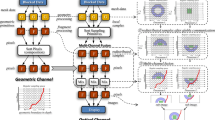Abstract
Parallel visualization is assuming an increasing role in the deployment of Web and Grid based systems for scientific applications. The visualization process consists of a set of filters or components that are executed in a pipelined assembly that should be adaptively configured on the basis of user requirements, processing architecture and network characteristics. In this paper we focus our attention on the visualization of 3D irregular meshes produced by the interrogation of volumetric data using an isosurface extraction algorithm. We consider a simplified pipeline consisting of two components: isosurface extraction, and mesh simplification. We show that also in this simple case an in-deep analysis is necessary in order to optimize the whole pipeline. In fact different implementation and load balancing strategies are possible for each single component, but the whole pipeline optimization could be achieved combining non-optimal implementation of individual stages. Moreover the quality of the produced mesh should be considered in the selection of an adequate component implementation. The proposed analysis permits to point out trade-offs and algorithmic requirements that should be considered in the design of a complete visualization system for advanced Grid applications.
Preview
Unable to display preview. Download preview PDF.
Similar content being viewed by others
References
Bethel, E.W., Shalf, J.: Grid-distributed visualizations using connectionless protocols. IEEE Computer Graphics and Applications, 23(2), 51–59 (2003)
Hamann, B., Bethel, W., Simon, H.D., Meza, J.C.: NERSC Visualization Greenbook: Future Visualization Needs of the DOE Computational Science Community Hosted at NERSC. Int. Journal of High Performance Computing Applications 17(2), 97–124 (2003) (SAGE)
Shalf, J., Bethel, E.W.: The Grid and Future Visualization System Architectures. IEEE Computer Graphics and Applications 23(2), 6–9 (2003)
Clematis, A., D’Agostino, D., De Marco, W., Gianuzzi, V.: A Web-Based Isosurface Extraction System for Heterogeneous Clients. In: Proceedings of the 29th Euromicro Conference, pp. 148–156. IEEE Computer Society Press, Los Alamitos (2003)
Lorensen, W., Cline, H.: Marching cubes: A high resolution 3-D surface construction algorithm. Computer Graphics 21, 163–169 (1987)
Clematis, A., D’Agostino, D., Gianuzzi, V.: An Online Parallel Algorithm for Remote Visualization of Isosurfaces. In: Dongarra, J., Laforenza, D., Orlando, S. (eds.) EuroPVM/MPI 2003. LNCS, vol. 2840, pp. 160–169. Springer, Heidelberg (2003)
Gotsman, C., Gumhold, S., Kobbelt, L.: Simplification and Compression of 3-D Meshes. In: Iske, A., Quak, E., Floater, M. (eds.) Tutorials on multiresolution in geometric modelling. Springer, Heidelberg (2002)
Garland, M., Heckbert, P.S.: Surface Simplification Using Quadric Error Metrics. Computer Graphics 31, 209–216 (1997)
D’Agostino, D.: A Parallel Simplification Algorithm based on the Quadric Error Metrics. Technical Report IMATI-CNR-Ge, No. 04/2005
Clematis, A., D’Agostino, D., Gianuzzi, V., Mancini, M.: Parallel Decimation of 3D Meshes for Efficent Web based Isosurface Extraction. Parallel Computing: Software Technology, Algorithms, Architectures & Applications. In: Joubert, G.R., Nagel, W.E., Peters, F.J., Walter, W.V. (eds.) Advances in Parallel Computing series, vol. 13, pp. 159–166. Elsevier, Amsterdam (2004)
Author information
Authors and Affiliations
Editor information
Editors and Affiliations
Rights and permissions
Copyright information
© 2005 Springer-Verlag Berlin Heidelberg
About this paper
Cite this paper
Clematis, A., D’Agostino, D., Gianuzzi, V. (2005). Load Balancing and Computing Strategies in Pipeline Optimization for Parallel Visualization of 3D Irregular Meshes. In: Di Martino, B., Kranzlmüller, D., Dongarra, J. (eds) Recent Advances in Parallel Virtual Machine and Message Passing Interface. EuroPVM/MPI 2005. Lecture Notes in Computer Science, vol 3666. Springer, Berlin, Heidelberg. https://doi.org/10.1007/11557265_58
Download citation
DOI: https://doi.org/10.1007/11557265_58
Publisher Name: Springer, Berlin, Heidelberg
Print ISBN: 978-3-540-29009-4
Online ISBN: 978-3-540-31943-6
eBook Packages: Computer ScienceComputer Science (R0)




